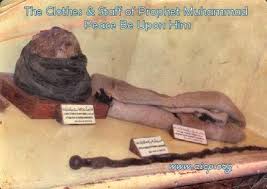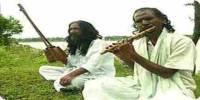Prophet Muhammad lived a fuller human life with all its imperfections and aspirations for perfections. His actions have become great citizenship models to emulate. It would be wrong for Muslims to claim him as their prophet, just as much as Christians claiming Jesus to be exclusive Christian or Hindus claiming Krishna to be theirs alone. The message of the entire array of the great spiritual teacher’ was for human kind, and not a particular group.What does it take to be a good Citizen? Some fourteen hundred years ago, Prophet Muhammad (pbuh) followed three simple principles to become great and a humane being to be truthful, trust worthy and the peacemaker; indeed he was called Al-Amin, a summation of the three qualities. He was trusted by all the tribes, even those at odds with each other, they could count on him to always be truthful. Much before the advent of Islam, once the sacred black corner stone called Aswad fell off the wall of the Kaaba, the sacred center of Mecca. The infighting among the tribes began as to who would be privileged to place the stone back in its place, as the conflict grew, they called upon Muhammad (the truthful and just) to find the solution. Muhammad was inherently a peace maker, and strove for peace among the communities. He laid out a sheet long enough on its perimeter for each one of the tribal leaders to place a hand on the sheet to lift the stone. He placed the stone in the middle of the sheet and had every one participate in lifting the stone up to set it in the wall. Thus he created a model of inclusiveness and co-existence.Muhammad wanted us to understand that Fairness and Justice sustains peace longer than any other thing. When we talk about Islam means peace, it means the ability to reduce conflicts in the world and bring harmony. It is our duty to reduce conflicts in the world and not just among Muslims. Let’s be the true peace makers of the world bring a balance to creation; among humans and the nature.It is to strive to achieve goodwill even with those who are bent on harming us. As Mother Teresa had once said, “if you want peace, you go talk with your enemies, for that’s who you make peace with”. Mahatma Gandhi said “if justice is an eye for an eye, then the whole world would be blind”.When Muhammad was traveling form Mecca to Taif, a few urchins threw rocks at him causing him some severe bleeding, his associates jumped on their feet and wanted to go thrash the kids, and angel Gabriel came to his rescue as well. Prophet Muhammad held him back and instead asked them join him in praying for goodwill.
God constantly tests us, to see if we swerve from our commitment to bring justice and peace, or fall to Satan. We are constantly tested and we succeed some and fail some. When Prophet Muhammad was depicted in cartoons, or when Taslima Nasrin said bad things about Islam or others saying wrong things about Islam, we have to adopt the posture of Muhammad to mitigate the conflict and pray for their goodwill and get drawn into it and conflagrate the situation. How we reign in on our reactions determines if we are following the role of peace maker that Muhammad established. Qur’aan, Al-Hujurat, 49:13 reads: “O mankind! We have created you male and female, and have made you nations and tribes that ye may know one another. The noblest of you, in sight of Allah, is the best in conduct. Allah Knows and is Aware.” All the great teachers of the world believed peace comes through justice to one and the all. Indeed, our pledge of allegiance spells that out “One nation under God with liberty and Justice for all.Today more than ever the Muslim world needs to look back at the practical aspects of the Prophet Muhammad S.A.W’s life and try to include them in our daily lives for peace and harmony. This is actually what Islam is all about. When Muslims accept a person as a Nabi, then they must believe in emulating the example set by the Nabi.The Quran tells us that all the Messengers were charged by Allah with the same mission. It is also written that all the people are a single Nation, so Allah has raised the bearers of His news and as warners and He revealed Unto them the truth. Prophet S.A.W received Divine revelations and translated it into action through his own example. He was the first to obey these laws and led other to pursue the path of guidance. Earlier Messengers had come with Allah’s message and guidance, but people changed these, corrupted them or simply hid them. Prophet S.A.W did not spread Islam through miracles. He worked what was more than a miracle; striving against odds and achieved success never seen before or since in history. But to achieve this success he did not resort of things beyond the human reach, in which case he would not have acted as an exemplary personality. He used all the honest and honorable means that were open to all others. He would plainly say that he was a man like all the others.The spirit infused by Prophet Muhammad S.A.W enabled the Muslims to face the most formidable of foes that a man has to face. He understood human nature and mind and did not propose to kill our instincts or crush our passion. Instead he propounded a system to control them so that they may function to our best advantage and pass from the bestial to the nobel Prophet S.A.W established a state with those at the helm of the affairs who did not rule but served the citizens. There was no prejudice of cast, creed or colour. To demolish this long prevailing injustice, it was emphasized that in the eyes of Allah Almighty the noblest was the one who the most virtuous among men. The life of Prophet S.A.W was very simple. He believed in un-ostentatious living. He would put on whatever kind of cloth he could get. He would eat whatever was placed before him. He would sit wherever he could find room, whether on a mat, carpet or on the ground. Unlike the modern rulers the Prophet Muhammad S.A.W entered into treaties with his enemies and honored them. Following the treaty of Hudaybiah in 6 A.H, he discouraged the Muslims of Makkah to flee the city. The surrender of Makkah offered him several opportunities for revenge but he did not avail a single one. As a role model we must remember that he ordered us to obey Allah’s commands, give alms, speak the truth, give back safe and whole what is entrusted to us, to be affectionate and caring to our neighbors.Every Muslim should examine, search and asses his deeds and review his conduct several times a day and follow the path which the greatest personality of all times has left for us to follow. The spirit infused by Prophet Muhammad S.A.W enabled the Muslims to face the most formidable of foes that a man has to face. He understood human nature and mind and did not propose to kill our instincts or crush our passion. Instead he propounded a system to control them so that they may function to our best advantage and pass from the bestial to the nobel Prophet S.A.W established a state with those at the helm of the affairs who did not rule but served the citizens. There was no prejudice of cast, creed or colour. To demolish this long prevailing injustice, it was emphasized that in the eyes of Allah Almighty the noblest was the one who the most virtuous among men. The life of Prophet S.A.W was very simple. He believed in un-ostentatious living. He would put on whatever kind of cloth he could get. He would eat whatever was placed before him. He would sit wherever he could find room, whether on a mat, carpet or on the ground.It is currently considered important to followers of Islam that Muhammad was named as one of history’s singular most influential humans. This opinion is asserted by one individual who created this list. He admits that he has placed Muhammad at the top of the list not only because he started a new religion, but because he was also a military leader and it is noteworthy that he is the only prophet with such a reputation. It is important to note that being influential in world history does not always equate to being an ideal role model. Case in point, Adolf Hitler is on this same list of influential human beings and we would all agree he was far from any kind of role model, no less ideal. Why? Because of his violence and hatred. It is also noted that Jesus is number 3 on this same list, but only because, according to the list compiler, his model of behavior is not applied sufficiently for it to be deemed influential. In other words, because humans have still been violent, his justification is that Jesus influence was limited. But this does not make the ideal he set forth not worthy of emulation. Thus, we can toss out the use of this particular list of influence in determining what makes an ideal role model to be followed, for the teachings of peace and the manner of Jesus are certainly worthy of emulation in spite of one person’s opinion on how it has not been achieved on a mass level.When considering the value of Muhammad as an ideal role model, it is assumed that the reason for a role model at all is for emulation. It is essential that we come to an agreement on the importance of morality. In doing this we must also consider what standard of perfection is required for one to be considered an ideal role model for human beings to follow or emulate. An ideal (perfect) role model would only be considered ideal if they presented an ideal moral example for all peoples in all places in all times. Otherwise, we are not striving for any higher standard of human behavior than what is already presented in the world in a common sense.If Muhammad is to be seen as an ideal role model he must then be above reproach in all matters of human jurisdiction, and ultimately must give an example that transcends common culture and human avarice. Since Muhammad claims to be speaking on behalf of God almighty, it is even more essential that he be of perfect moral character, and not just in the mythical leanings of his religious followers, but for recorded history.So we are left with the question, was Muhammad actually an ideal role model. If you are seeking a role model which raises one above the standard and common human reaction of violent retribution in the face of adversity he simply can not serve in such a capacity. It is recorded by his own honored companions in the deeds of the prophet that this man ordered assassinations of humans he believed were insulting to him or his new religion. If we look to how he managed criticism, by plotting to destroy his critics, it sets a very dangerous precedent when he claims also to be a man speaking on behalf of God. If we look at his justification for his raids on the caravans that led to violent bloodshed, that he was once driven from Mecca so he had a ‘right’ to become a thief to regain what he had lost, then we must disqualify him as an ideal role model for humanity, unless we wish to uphold looting and violent assaults under the guise of religious righteousness. If we look to the matter of personal integrity, where what he does mirrors exactly what he says, then we have to wonder why he took over 20 wives when he taught no more than 4 were acceptable. Apart from the moral acceptability of polygamy, we are dealing with a human who gave to himself, per Gods permission, rights that no other man could have regarding taking women for his own pleasure.In looking at the contrast between his actual life and deeds, in full totality, we see a mere human of no extraordinary character who used claims of religious authority to command armies, take lives, gain economically and dominate politically over the lives of humans who should be considered equal. If the golden rule is a universally applied truth, I can personally say that I would not want to be treated the way Muhammad treated his fellow humans whom he perceived to be enemies of God. A much better example came before him and gave a higher example, which was to do good to those who seek to harm you and to love your enemies as yourself. For a human to act as judge and jury in matters of human worth, and to murder human beings on behalf of his claim to prophetic authority sets a very dangerous precedent for human behavior. Thus, Muhammad as an ideal role model for human behavior fails on the record of his treatment of other human beings with enmity and violent disregard using religious fervor to justify it.
Today more than ever the Muslim world needs to look back at the practical aspects of the Prophet Muhammad S.A.W’s life and try to include them in our daily lives for peace and harmony. This is actually what Islam is all about. When Muslims accept a person as a Nabi, then they must believe in emulating the example set by the Nabi.
The Quran tells us that all the Messengers were charged by Allah with the same mission. It is also written that all the people are a single Nation, so Allah has raised the bearers of His news and as warners and He revealed Unto them the truth. Prophet S.A.W received Divine revelations and translated it into action through his own example. He was the first to obey these laws and led other to pursue the path of guidance. Earlier Messengers had come with Allah’s message and guidance, but people changed these, corrupted them or simply hid them.
Prophet S.A.W did not spread Islam through miracles. He worked what was more than a miracle; striving against odds and achieved success never seen before or since in history. But to achieve this success he did not resort of things beyond the human reach, in which case he would not have acted as an exemplary personalty. He used all the honest and honorable means that were open to all others. He would plainly say that he was a man like all the others.
The spirit infused by Prophet Muhammad S.A.W enabled the Muslims to face the most formidable of foes that a man has to face. He understood human nature and mind and did not propose to kill our instincts or crush our passion. Instead he propounded a system to control them so that they may function to our best advantage and pass from the bestial to the nobel
Prophet S.A.W established a state with those at the helm of the affairs who did not rule but served the citizens. There was no prejudice of cast, creed or colour. To demolish this long prevailing injustice, it was emphasized that in the eyes of Allah Almighty the noblest was the one who the most virtuous among men. The life of Prophet S.A.W was very simple. He believed in un-ostentatious living. He would put on whatever kind of cloth he could get. He would eat whatever was placed before him. He would sit wherever he could find room, whether on a mat, carpet or on the ground.
Unlike the modern rulers the Prophet Muhammad S.A.W entered into treaties with his enemies and honored them. Following the treaty of Hudaybiah in 6 A.H, he discouraged the Muslims of Makkah to flee the city. The surrender of Makkah offered him several opportunities for revenge but he did not avail a single one. As a role model we must remember that he ordered us to obey Allah’s commands, give alms, speak the truth, give back safe and whole what is entrusted to us, to be affectionate and caring to our neighbors.Every Muslim should examine, search and asses his deeds and review his conduct several times a day and follow the path which the greatest personality of all times has left for us to follow.
Prophet Muhammad The ideal role model
Prophet Muhammad lived a fuller human life with all its imperfections and aspirations for perfections. His actions have become great citizenship models to emulate. It would be wrong for Muslims to claim him as their prophet, just as much as Christians claiming Jesus to be exclusive Christian or Hindus claiming Krishna to be theirs alone. The message of the entire array of the great spiritual teacher’ was for human kind, and not a particular group.
The first model: Peace maker
What does it take to be a good Citizen? Some fourteen hundred years ago, Prophet Muhammad (pbuh) followed three simple principles to become great and a humane being to be truthful, trust worthy and the peacemaker; indeed he was called Al-Amin, a summation of the three qualities. He was trusted by all the tribes, even those at odds with each other, they could count on him to always be truthful. Much before the advent of Islam, once the sacred black corner stone called Aswad fell off the wall of the Kaaba, the sacred center of Mecca. The infighting among the tribes began as to who would be privileged to place the stone back in its place, as the conflict grew, they called upon Muhammad (the truthful and just) to find the solution.
Muhammad was inherently a peace maker, and strove for peace among the communities. He laid out a sheet long enough on its perimeter for each one of the tribal leaders to place a hand on the sheet to lift the stone. He placed the stone in the middle of the sheet and had every one participate in lifting the stone up to set it in the wall. Thus he created a model of inclusiveness and co-existence.
Muhammad wanted us to understand that Fairness and Justice sustains peace longer than any other thing. When we talk about Islam means peace, it means the ability to reduce conflicts in the world and bring harmony. It is our duty to reduce conflicts in the world and not just among Muslims. Let’s be the true peace makers of the world bring a balance to creation; among humans and the nature.
The second model: Praying for Goodwill
It is to strive to achieve goodwill even with those who are bent on harming us. As Mother Teresa had once said, “if you want peace, you go talk with your enemies, for that’s who you make peace with”. Mahatma Gandhi said “if justice is an eye for an eye, then the whole world would be blind”.
When Muhammad was traveling form Mecca to Taif, a few urchins threw rocks at him causing him some severe bleeding, his associates jumped on their feet and wanted to go thrash the kids, and angel Gabriel came to his rescue as well. Prophet Muhammad held him back and instead asked them join him in praying for goodwill.
God constantly tests us, to see if we swerve from our commitment to bring justice and peace, or fall to Satan. We are constantly tested and we succeed some and fail some. When Prophet Muhammad was depicted in cartoons, or when Taslima Nasrin said bad things about Islam or others saying wrong things about Islam, we have to adopt the posture of Muhammad to mitigate the conflict and pray for their goodwill and get drawn into it and conflagrate the situation. How we reign in on our reactions determines if we are following the role of peace maker that Muhammad established.
The third Model: Co-Existence
Co-existence is one of the finest examples of the Medina pact. A pact signed between Muhammad as the administrator of the City State of Medina and the Jews, Muslims, Christians and other tribes as the communities (Ummah) subscribing to the pact. The pact guaranteed the right to assemble, right to free speech and freedom to practice their faith.
Qur’aan, Al-Hujurat, 49:13 reads: “O mankind! We have created you male and female, and have made you nations and tribes that ye may know one another. The noblest of you, in sight of Allah, is the best in conduct. Allah Knows and is Aware.”
All the great teachers of the world believed peace comes through justice to one and the all. Indeed, our pledge of allegiance spells that out “One nation under God with liberty and Justice for all.
It is currently considered important to followers of Islam that Muhammad was named as one of history’s singular most influential humans. This opinion is asserted by one individual who created this list. He admits that he has placed Muhammad at the top of the list not only because he started a new religion, but because he was also a military leader and it is noteworthy that he is the only prophet with such a reputation. It is important to note that being influential in world history does not always equate to being an ideal role model. Case in point, Adolf Hitler is on this same list of influential human beings and we would all agree he was far from any kind of role model, no less ideal. Why? Because of his violence and hatred. It is also noted that Jesus is number 3 on this same list, but only because, according to the list compiler, his model of behavior is not applied sufficiently for it to be deemed influential. In other words, because humans have still been violent, his justification is that Jesus influence was limited. But this does not make the ideal he set forth not worthy of emulation. Thus, we can toss out the use of this particular list of influence in determining what makes an ideal role model to be followed, for the teachings of peace and the manner of Jesus are certainly worthy of emulation in spite of one person’s opinion on how it has not been achieved on a mass level.
When considering the value of Muhammad as an ideal role model, it is assumed that the reason for a role model at all is for emulation. It is essential that we come to an agreement on the importance of morality. In doing this we must also consider what standard of perfection is required for one to be considered an ideal role model for human beings to follow or emulate. An ideal (perfect) role model would only be considered ideal if they presented an ideal moral example for all peoples in all places in all times. Otherwise, we are not striving for any higher standard of human behavior than what is already presented in the world in a common sense.
If Muhammad is to be seen as an ideal role model he must then be above reproach in all matters of human jurisdiction, and ultimately must give an example that transcends common culture and human avarice. Since Muhammad claims to be speaking on behalf of God almighty, it is even more essential that he be of perfect moral character, and not just in the mythical leanings of his religious followers, but for recorded history.
So we are left with the question, was Muhammad actually an ideal role model. If you are seeking a role model which raises one above the standard and common human reaction of violent retribution in the face of adversity he simply can not serve in such a capacity. It is recorded by his own honored companions in the deeds of the prophet that this man ordered assassinations of humans he believed were insulting to him or his new religion. If we look to how he managed criticism, by plotting to destroy his critics, it sets a very dangerous precedent when he claims also to be a man speaking on behalf of God. If we look at his justification for his raids on the caravans that led to violent bloodshed, that he was once driven from Mecca so he had a ‘right’ to become a thief to regain what he had lost, then we must disqualify him as an ideal role model for humanity, unless we wish to uphold looting and violent assaults under the guise of religious righteousness. If we look to the matter of personal integrity, where what he does mirrors exactly what he says, then we have to wonder why he took over 20 wives when he taught no more than 4 were acceptable. Apart from the moral acceptability of polygamy, we are dealing with a human who gave to himself, per Gods permission, rights that no other man could have regarding taking women for his own pleasure.
I can not accept Muhammad as a man of God, no less a perfect role model, with these glaring defects of character recorded by his own faithful companions in history. In looking at the contrast between his actual life and deeds, in full totality, we see a mere human of no extraordinary character who used claims of religious authority to command armies, take lives, gain economically and dominate politically over the lives of humans who should be considered equal. If the golden rule is a universally applied truth, I can personally say that I would not want to be treated the way Muhammad treated his fellow humans whom he perceived to be enemies of God. A much better example came before him and gave a higher example, which was to do good to those who seek to harm you and to love your enemies as yourself. For a human to act as judge and jury in matters of human worth, and to murder human beings on behalf of his claim to prophetic authority sets a very dangerous precedent for human behavior. Thus, Muhammad as an ideal role model for human behavior fails on the record of his treatment of other human beings with enmity and violent disregard using religious fervor to justify it.
















